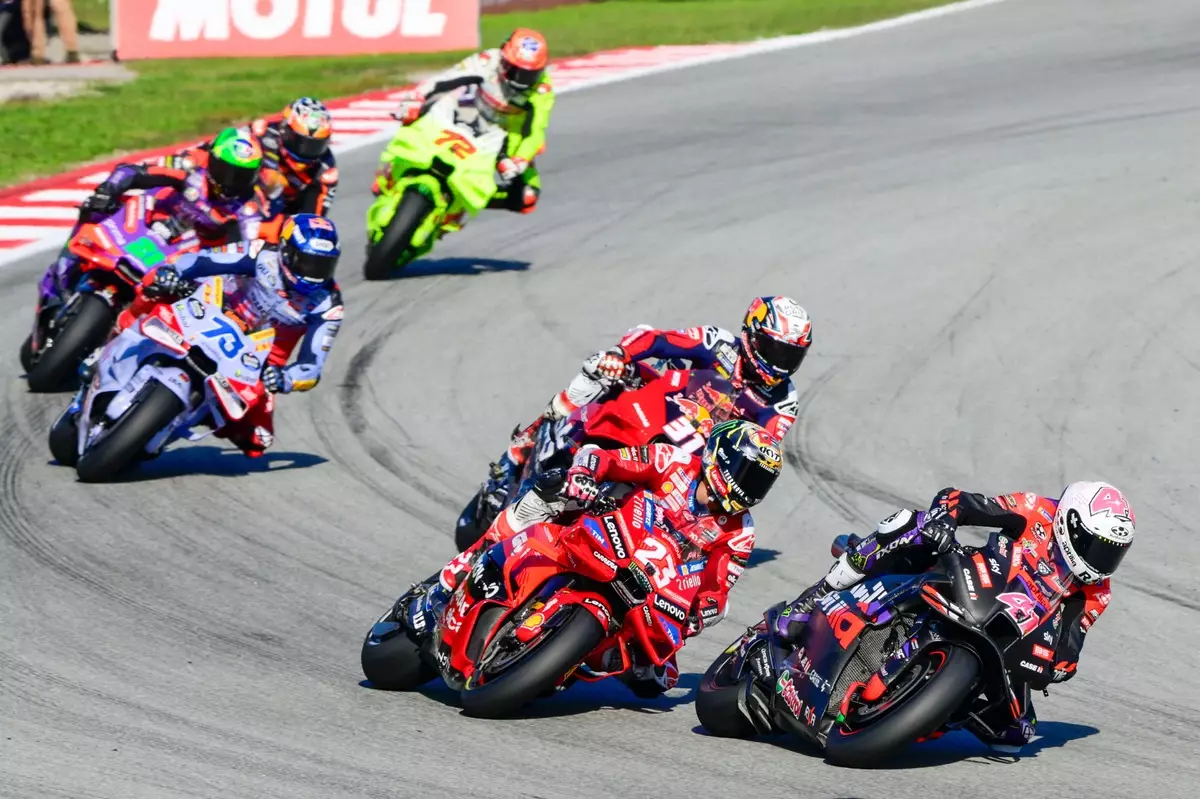The recent Barcelona Grand Prix not only showcased the high-stakes battle for the championship but also ignited a contentious dispute between Ducati’s Enea Bastianini and Aprilia’s Aleix Espargaro. Following the race, Bastianini leveled accusations against Espargaro, suggesting that the latter’s performance on the track was less about competition and more about loyalty to his compatriot, Jorge Martin. This incident brings to light numerous questions regarding sportsmanship, loyalty, and the nature of competition in MotoGP.
Bastianini expressed his discontent over Espargaro’s defensive maneuvers, characterizing them as unprofessional. He claimed that Espargaro seemed to prioritize Martin’s title chances over his own race strategy, hindering Bastianini’s own results. After a challenging start from the second position on the grid, Espargaro found himself in fourth, where he adopted the role of a rear-gunner, effectively protecting Martin from the aggressive competition by other Ducati riders, including Francesco Bagnaia. Bastianini’s seventh-place finish reflected not just an underwhelming result but also a lost opportunity to compete more rigorously for a higher position, particularly against Marc Marquez in the championship standings.
At the heart of this spat lies a tangled relationship dynamic—friendship intertwined with fierce competition. Espargaro admitted that his camaraderie with Martin drove his determination throughout the race. He described Martin as a “little brother” and felt a sense of duty to assist in his title bid, which further complicates the narrative. Espargaro’s commitment to assist Martin might appear commendable on the surface, but it raises ethical questions. Is it right for a rider to compromise the integrity of a competitive race for personal loyalties?
Bastianini’s visible frustration calls into question the moral obligations among competitors. While helping a friend in a fiercely competitive sport might seem justifiable, it opens the doors to potential favoritism and could set a problematic precedent. Racing, by its very nature, is predicated upon individual merit and performance, and when personal affiliations start to dictate race outcomes, the sport’s competitive spirit could suffer.
Claims and Counterclaims: A Chaotic Narrative
After the race, Bastianini did not hold back in criticizing Espargaro’s tactics, implying they went beyond the bounds of sportsmanship. He argued that these defensive strategies should not be tolerated in such a high-caliber championship, suggesting that they detracted from the intrinsic competitiveness of MotoGP. In his view, this was a violation worthy of reproach, one that thwarted the aspirations of other riders.
In a dramatic counter-response, Espargaro challenged Bastianini’s accusations, stating that the Italian was merely not performing as expected. In his defense, Espargaro asserted that he was not intentionally delaying the race pace to assist Martin at the expense of his competitors. Instead, he pointed to his fierce competition with Alex Marquez as evidence of his genuine effort to race hard until the very end. Espargaro maintained that he was not riding conservatively but rather pushing the limits of his capabilities, declaring that blaming him for another’s shortcomings was neither fair nor justified.
This back-and-forth further fuels an already heated rivalry, highlighting how personal biases and competitive pressures can distort perceptions of a rider’s performance and intentions. The narrative captures more than just a battle for podium places; it reveals the tensions that can arise in a sport where personal relationships and professional rivalries often collide.
As the dust settles from the Barcelona Grand Prix, this episode serves as a pivotal moment for MotoGP and its followers to reflect on the deeper implications of their sport. The incident not only underlines the challenges of maintaining competitive integrity in the face of personal relationships but also invites discussions on what constitutes acceptable behavior among riders in their quest for glory.
The profession of a motorcycle racer is accompanied by immense pressure, and the reality is that friendships can be strained under the weight of rivalry. Espargaro’s supportive stance poses the question of where one should draw the line between loyalty to friends and respect for competitors. Ultimately, while the camaraderie and support among riders can enhance the communal spirit of the sport, races should primarily be fought on fair terms — a principle that both Bastianini and Espargaro must negotiate moving forward.
The Barcelona Grand Prix was more than just another event in the MotoGP calendar; it emerged as a case study in competitive ethics, loyalty, and the complexities of sporting rivalries. How the riders navigate the aftermath of this confrontation could set significant precedents in the landscape of motorcycle racing, illuminating the ever-present tension between friendship and competition.

